This post is based on a prayer session that I led today. The title comes from a book of meditations by Eddie Askew, and the idea is that to appreciate God’s presence we need to be moving at a pace ‘slower than butterflies’.
During the Covid-19 lockdown I have been doing more walking, and more photography than usual. I do love photographing butterflies, but it requires patience. Although they don’t fly fast, they rarely stay in one place for more than a few seconds. You have to stay around, observing them carefully and moving in slowly and quietly with the camera to get a good photo.
So here are some of my butterfly photographs, with some Biblical reflections about living slowly.
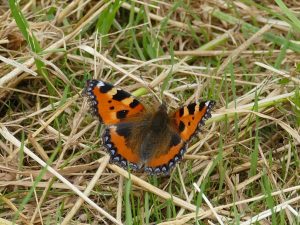
This is a small tortoiseshell, photographed on a riverbank – a very quiet place away from the noise of traffic. We often need to find somewhere quiet to slow down and experience God in the silence. The Prophet Elijah found this when he fled to a cave in the desert to escape persecution, in words that you may recognise from a well known hymn..
Now there was a great wind, so strong that it was splitting mountains and breaking rocks in pieces before the Lord, but the Lord was not in the wind; and after the wind an earthquake, but the Lord was not in the earthquake; and after the earthquake a fire, but the Lord was not in the fire; and after the fire a sound of sheer silence. When Elijah heard it, he wrapped his face in his mantle and went out and stood at the entrance of the cave. Then there came a voice to him that said, ‘What are you doing here, Elijah?’ (1 Kings 19:11-15)

This is a ringlet, photographed alongside a footpath across farmland. Sometimes you have to look long and carefully to spot the butterfly, especially a dull coloured one like this, and only see it clearly for a moment before it flutters away. That’s a bit like the Holy Spirit of God – often we only have a brief experience of the Spirit before she seems to flutter away again. But even that brief experience may send us away rejoicing. Perhaps that’s what St John had in mind when he wrote the following letter. The word for “looked at” implies a lingering gaze rather than a brief glimpse, reminding us that the wait may be long before the experience arrives.
We declare to you what was from the beginning, what we have heard, what we have seen with our eyes, what we have looked at and touched with our hands, concerning the word of life— this life was revealed, and we have seen it and testify to it, and declare to you the eternal life that was with the Father and was revealed to us— we declare to you what we have seen and heard so that you also may have fellowship with us; and truly our fellowship is with the Father and with his Son Jesus Christ. We are writing these things so that our joy may be complete. (1 John 1:1-4)
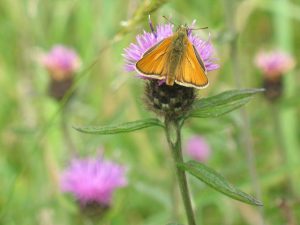
This is a skipper, feeding on knapweed. Butterflies and other insects have a symbiotic relationship with flowers – the insects feed on nectar, while they in turn pollinate other flowers, and so both species can continue to flourish. Jesus spoke of how birds and flowers depend on God for their existence without worrying –
Look at the birds of the air; they neither sow nor reap nor gather into barns, and yet your heavenly Father feeds them. Are you not of more value than they? And can any of you by worrying add a single hour to your span of life? And why do you worry about clothing? Consider the lilies of the field, how they grow; they neither toil nor spin, yet I tell you, even Solomon in all his glory was not clothed like one of these. But if God so clothes the grass of the field, which is alive today and tomorrow is thrown into the oven, will he not much more clothe you—you of little faith? (Matthew 6:26-30)
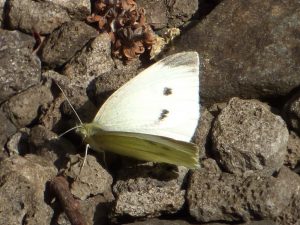
This cabbage white butterfly was basking on ballast on a railway line – a hot, dry and potentially dangerous environment with no source of food. But we can still find God even in places that seem a long way from a comfortable life, in the “valley of darkness” as well as the “green pastures”, as Psalm 23 reminds us –
The Lord is my shepherd, I shall not want.
He makes me lie down in green pastures;
he leads me beside still waters;
he restores my soul.
He leads me in right paths
for his name’s sake.
Even though I walk through the darkest valley,
I fear no evil;
for you are with me;
your rod and your staff—
they comfort me.
(Psalm 23:1-4)
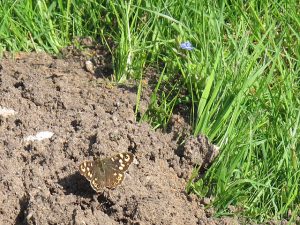
I found this speckled wood butterfly in a country churchyard. The mound of earth may well have come from a recently dug grave. As an old Christian proverb says, “In the midst of life we are in death”. But butterflies are often held up as a parable of the resurrection: the earthbound caterpillar effectively dies as it turns into a chrysalis, which after a while yields the gloriously coloured, flighty creature that in its previous existence could not have imagined the glory that was to come. As Jesus explained –
Very truly, I tell you, unless a grain of wheat falls into the earth and dies, it remains just a single grain; but if it dies, it bears much fruit. (John 12:24)
So take some time today to slow down to butterfly pace, appreciate the silence, look for the signs of God in the natural world, trust Him for your material needs, and remember that beyond suffering and death will be the unimagined wonder of the world to come.
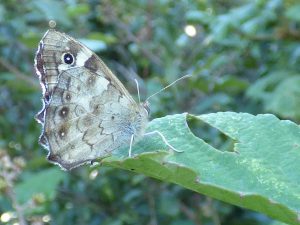
A grayling butterfly, seen on the Cornish coast path.
May the wings of the butterfly kiss the sun.
And find your shoulder to light on.
To bring you luck, happiness, and riches.
Today, tomorrow, and beyond.
(an anonymous Irish blessing)
Copyright (c) Stephen Craven 2020. Quotations from New Revised Standard Version Bible: Anglicized Edition, copyright © 1989, 1995 National Council of the Churches of Christ in the United States of America.






